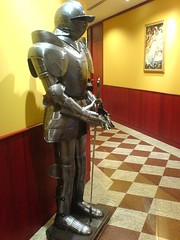Pear-shaped Things, the King of Kings and Psalm 1:1
There are days when everything seems to go pear-shaped and injustice reigns and the old self wants to retaliate and give as good as it gets. And there is a tussle with the new self not to sin against neighbour in the name of justice. And amidst the struggle, you go for a cuppa in the pantry and something reminds you that above all, there is a King of Kings.
So true justice is the Lord's (Proverbs 20:22). So though non-retaliation may seem uncommonly foolish in the commercial world, and may mean more trouble later, you consciously choose this path because you live to please only God. And if he is truly the King of Kings, even if things take a turn for the worse in the future, he will not let you be tempted (beyond what you can bear) to despise his way.
Psalm 1
Interestingly, the ARPC DGs are studying 2 distinct ways of living (from Psalm 1) this week. Scholars often take Psalm 1 as the preface to the "5 books" of the Psalms (the psalms being divided into sections at Psalms 1, 42, 73, 90 and 107). Unlike many of the psalms in the first book, it bears no title or author's name.
Genre
We are told that distinct from English poetry where the piece is organised around the rhyme or meter, Hebrew (and particularly Old Testament) poetry is organised around symmetry or parallelism of the piece, the arrangement of thoughts to each other (though the exact types of parallelism are the subject of much discussion). Robert Lowry identified 3 main types: synonymous, antithetic, and synthetic.
Synonymous parallelism is where the thought of the first line is repeated in the lines that follow:
"blessed" - in the NIV, the word "happy" is used in place of "blessed". Apparently, this does not accurately translate the Hebrew "ashre" which is related to the verb that means "right, straight". It refers to the conditions and situation of the one who is right with God and the pleasure and satisfaction that is derived from that (cf 1 Kings 10:8, though the ESV translators don't seem to be quite consistent!).
Sober choice is the basis of the righteous man's blessedness. He does not walk in the counsel of the wicked, nor stand in the way of sinners, nor sit in the seat of scoffers.
If we see synonymous parallelism in these lines, then it would be reading too much to draw some moral from the progression from walking to standing to sitting. Rather, Derek Kidner suggests that accepting advice from the wicked, being party to the ways of sinners and adopting the attitude of scoffers encompasses the realms of thinking, behaving and belonging, in which a person's fundamental choice of allegiance is made and carried through. Whoever we are, that is where the fundamental choices of loyalty are made throughout our lives.
And the psalmist says,"Blessed is the man who does not choose the realm of this world". The world's way might appear prosperous one, and it could actually work for a while. But from the rest of Psalm 1, we see that ultimately, it deceives, for in the end it doesn't work.
Dick Lucas, who managed to preach one sermon on each of the first 3 verses of Psalm 1, spells this out for us:
Therefore, the Christian must be decisive and not dither. Dick Lucas gives an alternative translation of Psalm 1:1: Unhappy will be the man who dithers, who wants it both ways, who sits on the fence, who loves to "hunt with the hounds and run with the hare". That kind of person wants to have both God's way and that of the world; he wants to steer a course between the two, and never decisively comes onto Christ's side. Even though we make a decision for Christ at one point of time in our lives, we go on making it throughout our lives.
It's amazing that the Psalmist was writing Psalm 1 first to a Old Testamental audience. He was setting before them 2 paths: (1) the path of the righteous, the Word-loving, who are stable and fruitful and are in a right relationship with God; and (2) the path of the wicked, the sinners, the scoffers, who will be destroyed and will perish. Of course, they were already standing on the second path, but how would they ever get onto the first path?
We know that from the time of Adam and Eve, the human mind and heart have been too corrupt, too anti-God, to make a choice for the first path, the path of life. Except for one human, Jesus, who was the only righteous, Scripture-loving person who was in a right relationship with God and whom God preserved even through his death on the cross.
So we are looking not at BoyScout GirlGuide goodytwoshoes-ness or the morality of the civilisedandcultured. We are looking at the miracle that the death, resurrection and ascension of Jesus unleashed; that from Pentecost, repentant sinners and scoffers could have the Holy Spirit himself living in them, working in them through the Word of God, changing their minds and hearts so that they could, in fact, choose the path of the righteous and thereafter live in a stable, fruitful, right relationship with God and not perish.
As Graeme Goldsworthy is wont to say: the Psalms typically speak of the ideal that in our experience is unattainable except for the experience of being justified in Christ.
So true justice is the Lord's (Proverbs 20:22). So though non-retaliation may seem uncommonly foolish in the commercial world, and may mean more trouble later, you consciously choose this path because you live to please only God. And if he is truly the King of Kings, even if things take a turn for the worse in the future, he will not let you be tempted (beyond what you can bear) to despise his way.
Psalm 1
Interestingly, the ARPC DGs are studying 2 distinct ways of living (from Psalm 1) this week. Scholars often take Psalm 1 as the preface to the "5 books" of the Psalms (the psalms being divided into sections at Psalms 1, 42, 73, 90 and 107). Unlike many of the psalms in the first book, it bears no title or author's name.
Genre
We are told that distinct from English poetry where the piece is organised around the rhyme or meter, Hebrew (and particularly Old Testament) poetry is organised around symmetry or parallelism of the piece, the arrangement of thoughts to each other (though the exact types of parallelism are the subject of much discussion). Robert Lowry identified 3 main types: synonymous, antithetic, and synthetic.
Synonymous parallelism is where the thought of the first line is repeated in the lines that follow:
Psalm 1:1 Blessed is the man who walks not in the counsel of the wicked,Antithetical parallelism: the thought of first line is repeated but in a negative or contrasting manner in second line
nor stands in the way of sinners,
nor sits in the seat of scoffers;
Psalm 1:1 Blessed is the man who walks not in the counsel of the wicked,
(Blessed is the man who does not) stand in the way of sinners,
(Blessed is the man who does not) sit in the seat of scoffers;
Psalm 1:6 for the LORD knows the way of the righteous,Synthetic parallelism: The second line takes up the thought of the first line and develops it further. It adds information to what has already been said
but the way of the wicked will perish
Psalm 1:3 He is like a treePsalm 1:1
planted by streams of water
that yields its fruit in its season,
and its leaf does not wither.
In all that he does, he prospers.
"blessed" - in the NIV, the word "happy" is used in place of "blessed". Apparently, this does not accurately translate the Hebrew "ashre" which is related to the verb that means "right, straight". It refers to the conditions and situation of the one who is right with God and the pleasure and satisfaction that is derived from that (cf 1 Kings 10:8, though the ESV translators don't seem to be quite consistent!).
Sober choice is the basis of the righteous man's blessedness. He does not walk in the counsel of the wicked, nor stand in the way of sinners, nor sit in the seat of scoffers.
If we see synonymous parallelism in these lines, then it would be reading too much to draw some moral from the progression from walking to standing to sitting. Rather, Derek Kidner suggests that accepting advice from the wicked, being party to the ways of sinners and adopting the attitude of scoffers encompasses the realms of thinking, behaving and belonging, in which a person's fundamental choice of allegiance is made and carried through. Whoever we are, that is where the fundamental choices of loyalty are made throughout our lives.
And the psalmist says,"Blessed is the man who does not choose the realm of this world". The world's way might appear prosperous one, and it could actually work for a while. But from the rest of Psalm 1, we see that ultimately, it deceives, for in the end it doesn't work.
Dick Lucas, who managed to preach one sermon on each of the first 3 verses of Psalm 1, spells this out for us:
this person does not accept the world's advice; he is not a party to its ways in terms of morality, behaviour, conventions and business ethics. He doesn't adopt its most fatal of attitudes, which is cynicism, scoffing and sophisticated mockery towards the things of God...Therefore, the Christian will be an awkward person, not because he is prickly or lacks EQ, but because he cannot conform. He will stick out like a sore thumb. He will not truly fit in either at work, at school or even in his family.
Therefore, the Christian must be decisive and not dither. Dick Lucas gives an alternative translation of Psalm 1:1: Unhappy will be the man who dithers, who wants it both ways, who sits on the fence, who loves to "hunt with the hounds and run with the hare". That kind of person wants to have both God's way and that of the world; he wants to steer a course between the two, and never decisively comes onto Christ's side. Even though we make a decision for Christ at one point of time in our lives, we go on making it throughout our lives.
It's amazing that the Psalmist was writing Psalm 1 first to a Old Testamental audience. He was setting before them 2 paths: (1) the path of the righteous, the Word-loving, who are stable and fruitful and are in a right relationship with God; and (2) the path of the wicked, the sinners, the scoffers, who will be destroyed and will perish. Of course, they were already standing on the second path, but how would they ever get onto the first path?
We know that from the time of Adam and Eve, the human mind and heart have been too corrupt, too anti-God, to make a choice for the first path, the path of life. Except for one human, Jesus, who was the only righteous, Scripture-loving person who was in a right relationship with God and whom God preserved even through his death on the cross.
So we are looking not at BoyScout GirlGuide goodytwoshoes-ness or the morality of the civilisedandcultured. We are looking at the miracle that the death, resurrection and ascension of Jesus unleashed; that from Pentecost, repentant sinners and scoffers could have the Holy Spirit himself living in them, working in them through the Word of God, changing their minds and hearts so that they could, in fact, choose the path of the righteous and thereafter live in a stable, fruitful, right relationship with God and not perish.
As Graeme Goldsworthy is wont to say: the Psalms typically speak of the ideal that in our experience is unattainable except for the experience of being justified in Christ.
























